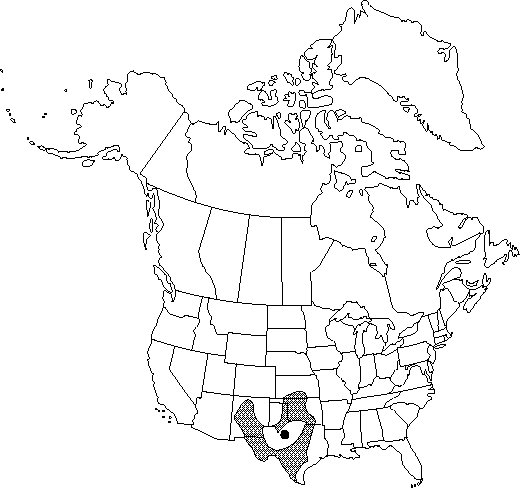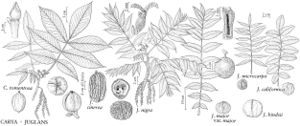Juglans microcarpa
in J. L. Berlandier and R. Choval, Diario Viaje Comis. Limites, 276. 1850.
Shrubs or small trees, to 10 m. Bark medium gray, split into ± rough ridges. Twigs with distal edge of leaf scar notched, glabrous or bordered by poorly defined velvety zone; pith light to dark brown. Terminal buds globose to short-ovoid, not flattened, 3-5 mm. Leaves 12-29 cm; petiole 1-3(-4) cm. Leaflets 17-25, lanceolate or narrowly lanceolate, weakly to strongly falcate, 5.2-6.3(-9.6) × 0.8-1.1(-2.2) cm, margins entire or toothed, apex long-acuminate; surfaces abaxially with capitate-glandular hairs (sometimes becoming sparse late in season except along veins), often scattered scales, axils of proximal veins usually, not always, with prominent tufts of fasciculate hairs, adaxially with capitate-glandular hairs (late in season hairs sometimes becoming sparse except along veins); terminal leaflet usually small. Staminate catkins 3-7 cm; stamens 20-25(-35) per flower; pollen sacs 0.8-1 mm. Fruits 1-3, globose, 1.4-2.3 cm, smooth, with capitate-glandular hairs; nuts globose to depressed-globose, 1.1-1.7 cm, grooved, surface between grooves smooth.
Phenology: Flowering spring (Mar–Apr[-Jun]).
Habitat: Along creeks and rivers
Elevation: 200-2000 m
Distribution

Kans., N.Mex., Okla., Tex., Mexico (Chihuahua, Coahuila, and Nuevo León).
Discussion
Specimens of Juglans microcarpa with larger leaflets (parenthetical numbers above) may result from introgression with J. major. These have sometimes been treated as J. microcarpa var. stewartii (I. M. Johnston) W. E. Manning, but W. E. Manning (1978) reported this variety only from Mexico. Intermediates between J. microcarpa and J. nigra (q.v.) are also known.
Selected References
None.
